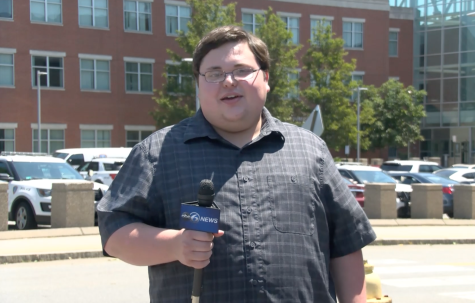COVID-19 vaccines required for students returning this fall
Roger Williams University President Ioannis Miaoulis recently announced that the university plans for a fully in-person semester this fall and the COVID-19 vaccine will be required for returning students. The news came in an all-student email on April 1.
“RWU’s goal for fall 2021 is to create as safe and engaging an environment as possible that allows our students to enjoy the fullest extent of learning opportunities and college life,” Miaoulis told The Hawks’ Herald. “Achieving a high level of community immunity will enable a fall semester with more options and fewer restrictions.”
Students had mixed reactions about the decision to require the vaccine. Some students, including freshman Tessa Yudden, liked the idea.
“I really think that it [requiring vaccines] should be implemented because there are other vaccines we’re required to get and this is a private university,” Yudden said. “They can ask us to get it under their circumstances, so I think that is a good idea.”
Sophomore Mollie Feldman expressed a similar sentiment.
“I think requiring vaccines could be a good thing,” Feldman said. “I think that everyone has to prioritize safety so that is really important and I plan on getting mine.”
Sophomore Kieran Leary said he thought the university should not require students to be vaccinated.
“I feel like the university shouldn’t require students to be vaccinated because a lot of people don’t really want the vaccine,” Leary said. “However, if the university feels that is the safest thing to do, then good for them.”
Vice President of Student Life John King provided insight into the decision-making process, saying the topic was an ongoing discussion for the past few months at the cabinet level. He said there were several discussions regarding how important it would be to be on the same page regarding vaccinations for the upcoming year.
“I think that in order to have the fullest and most robust campus life and experiences for next year, both on and off-campus including volunteer work, internships, civic engagement, athletics, social events and clubs and organizations, having a campus that is almost fully vaccinated with the exception of any religious or medical exceptions is a very important component to reaching that level of normalcy we all seek,” King said.
Miaoulis said having students vaccinated puts them in a better position for getting the internships they want.
“Since we do not know what employers and community sites will require, ensuring vaccination for our students ensures our students will be well-positioned for internships, external research opportunities and community-engaged projects, which give our students real-world training and skills,” Miaoulis said. “Further, these opportunities require students to go out into different workplaces and interact with employers, customers, schools for student teaching and with the people that they serve, often working with the most vulnerable communities. Those employers, nonprofits and partners will feel more assured and confident in bringing our students to their site if they know our students have been vaccinated.”
King said he and the rest of the President’s cabinet feel confident the university can have a fully in-person semester because of the vaccine requirement. Provost and Senior Vice President for Academic Affairs Margaret Everett also expressed confidence in having an in-person semester. She said the university is planning to have in-person classrooms at full capacity.
“I’m very hopeful we’ll have a semester that has many fewer restrictions on all of our movement and ability to engage with others and to be in groups,” Everett said. “That, for me, is a really joyful thing.”
Everett said classrooms will look more like what the university was like before the pandemic, with more students being able to do group work and interact with each other inside and outside of class. She said the university is working with its instructional designers to figure out ways faculty can continue using pandemic learning technology in a post-pandemic learning environment.
“One sort of obvious thing we have benefitted from this year is that when you’re doing a lot of remote things, you’re able to bring a great guest speaker who doesn’t have to get on a plane, come to your campus and stay in a hotel,” Everett said. “We’ve had some incredible speakers in the School of Business who are really amazing, accomplished people from industry and they wouldn’t ordinarily be able to take a full day off to come and speak to our students.”
Many students, including Feldman and sophomore Ben Dubois, are looking forward to the fully in-person semester.
“I think it’s a really important thing for everyone to just get back into a different routine,” Feldman said. “In my experience with online learning, I know I get distracted easily, so I’ll be doing something and then I hear a noise and I turn around. I’m like, ‘Oh my God! What’s going on?’ I think in-person, you’re in the classroom, you’re a lot more focused and you’re paying attention.”
Dubois said he thinks the university could have a successful in-person semester, but there might still be COVID-19 cases.
“I still think there will be some COVID cases in the fall semester, but I don’t think it will be too bad,” Dubois said. “I think it would be alright if the university gave us the option to do online classes just to let kids if they felt comfortable doing their learning online instead of in-person.”
Everett said some students have expressed an interest in learning fully remotely or having some online classes for the fall semester.
“Right now, we’re working on gathering from students their interests and intentions for the fall so that we can plan a mix of curriculum that meets their needs,” Everett said. “In terms of in-person, we expect the majority of classes to be in-person.”
In the April 1 email, President Miaoulis said there may still be some form of surveillance testing, masking and distancing.
King said he expects the university will need to test at the beginning of the semester and then do surveillance testing, adding the university is still trying to figure out what methods could be used. Pool testing could be one of those methods.
“Pool testing is essentially 1/10 the cost of our current testing program,” King said. “Pool testing is surveillance testing where 10 people’s swabs are analyzed at the same time in the same container and the information for all 10 of those people in that particular pooled vial is carefully chronicled. If there is a positive within that 10, then we can go and test all 10 people with individualized tests.”
King said specifics on what kind of surveillance testing, masking and distancing will be present in the fall are unknown because the university cannot predict what the pandemic will look like in August. Despite some uncertainty, Miaoulis believes this month was the right time to announce the university’s plans.
“Right now, students are registering for fall courses and high school seniors are choosing a university to attend this fall,” Miaoulis said. “We are starting the conversation now so students know what our plan is and they can prepare to get vaccinated before coming to campus… August is not that far away.”

Jimmy Sadowski is a journalist with experience in print, multimedia, and broadcast journalism. Sadowski’s specialty is news, but can also provide...





